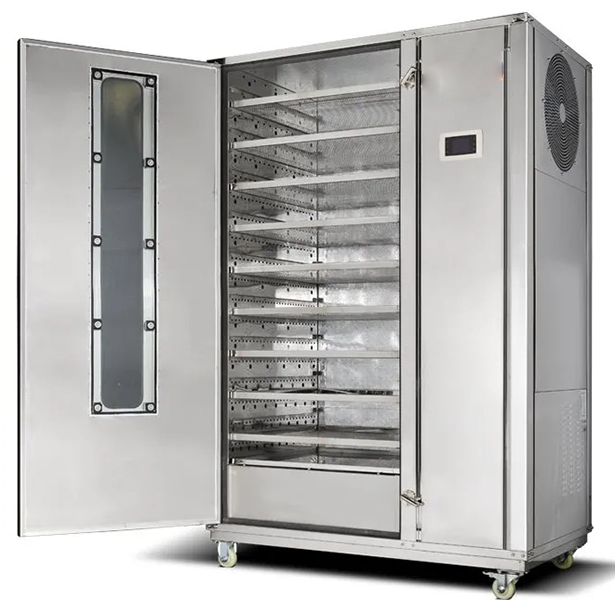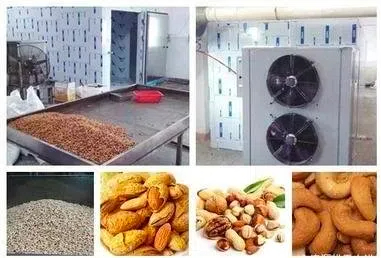
Content Menu
● Understanding Heat Pump Dryers
● Key Features of Smart Heat Pump Dryers
>> 1. Smart Control Systems
>> 2. AI-Powered Drying Cycles
>> 3. Energy Monitoring
>> 4. Built-in Sensors
>> 5. Quiet Operation
● Applications of Smart Heat Pump Dryers
>> Food Drying
● Benefits of Using Smart Heat Pump Dryers
● Comparing Smart Heat Pump Dryers with Traditional Dryers
● Maintenance Tips for Smart Heat Pump Dryers
● Conclusion
● FAQs
>> 1. What is a smart heat pump dryer?
>> 2. How does a heat pump dryer work?
>> 3. Are heat pump dryers suitable for food drying?
>> 4. What are the energy savings compared to traditional dryers?
>> 5. Can I monitor my dryer remotely?
In recent years, the demand for energy-efficient and environmentally friendly appliances has surged. Among these innovations, smart heat pump dryers have emerged as a popular choice for both households and businesses. These dryers utilize advanced technology to provide effective drying solutions while minimizing energy consumption. This article explores the features, benefits, and applications of smart heat pump dryers, particularly in the context of food drying.

Understanding Heat Pump Dryers
Heat pump dryers operate on a unique principle that sets them apart from traditional dryers. Instead of venting hot air outside, they recycle the air within the machine. This closed-loop system not only conserves energy but also allows for more precise control over drying temperatures.
- Energy Efficiency: One of the most significant advantages of heat pump dryers is their energy efficiency. They use up to 50% less energy than conventional dryers by recycling heat.
- Gentle Drying: These dryers operate at lower temperatures, which helps protect delicate fabrics and reduces wear and tear on clothes.
- Versatility: Heat pump dryers can be used in various settings, including homes, apartments, and even commercial environments like food processing facilities.
Key Features of Smart Heat Pump Dryers
Smart heat pump dryers come equipped with several innovative features that enhance their functionality and user experience:
1. Smart Control Systems
Many modern heat pump dryers include smart control systems that allow users to monitor and control the drying process remotely through smartphone apps. This feature enables users to:
- Start or stop drying cycles from anywhere.
- Receive notifications when a cycle is complete.
- Access troubleshooting guides directly from their devices.
This connectivity not only adds convenience but also allows users to integrate their dryer into smart home ecosystems, enabling voice commands through platforms like Amazon Alexa or Google Assistant.
2. AI-Powered Drying Cycles
Some models incorporate artificial intelligence (AI) to optimize drying cycles based on user habits and fabric types. These systems can:
- Learn from previous cycles to suggest optimal settings.
- Adjust drying times automatically based on moisture levels detected in the load.
This feature ensures that clothes are dried efficiently without risking damage from over-drying, which can lead to shrinking or fabric deterioration.
3. Energy Monitoring
Smart heat pump dryers often include energy monitoring features that allow users to track their energy consumption over time. This data can help identify trends and encourage more efficient usage patterns. Some models provide insights into peak usage times, helping users adjust their habits for further savings.
4. Built-in Sensors
Advanced sensors in heat pump dryers detect moisture levels in garments and adjust drying times accordingly. This prevents over-drying, which can damage fabrics and waste energy.
- Humidity Sensors: These sensors measure the humidity level inside the drum and adjust the drying cycle based on real-time data, ensuring optimal performance.
- Temperature Control: By maintaining lower temperatures during drying, these machines protect sensitive fabrics while still achieving efficient results.
5. Quiet Operation
Unlike traditional dryers that can be noisy, heat pump dryers typically operate at lower noise levels due to their design and technology, making them suitable for use in homes without disturbing daily activities. Many models are designed with sound-dampening materials that further reduce operational noise.

Applications of Smart Heat Pump Dryers
While heat pump dryers are commonly associated with laundry, they also have significant applications in food processing and preservation:
Food Drying
Food dehydrators are essential for preserving fruits, vegetables, herbs, and meats by removing moisture content. Smart heat pump dryers can effectively serve this purpose by providing controlled temperatures that facilitate even drying without compromising the quality of the food.
- Nutrient Preservation: By using lower temperatures during the drying process, smart heat pump dryers help retain more nutrients compared to traditional methods. This is particularly important for health-conscious consumers who want to maximize the nutritional value of their dried foods.
- Versatile Usage: These dryers can be used for various food items, including:
- Fruits (apples, bananas, strawberries)
- Vegetables (carrots, tomatoes)
- Herbs (basil, thyme)
- Meats (jerky)
The ability to dry food at home not only provides a cost-effective solution but also allows for customization of flavors and ingredients without preservatives or additives commonly found in store-bought dried foods.
Benefits of Using Smart Heat Pump Dryers
The integration of smart technology into heat pump dryers offers numerous benefits:
- Cost Savings: Users can expect lower utility bills due to reduced energy consumption. The initial investment in a smart heat pump dryer often pays off through savings over time.
- Environmental Impact: By using less energy and producing fewer emissions than traditional dryers, these appliances contribute to a more sustainable environment. Many consumers today are looking for ways to reduce their carbon footprint; opting for a smart heat pump dryer is one effective step toward achieving this goal.
- Convenience: The ability to control drying processes remotely adds a layer of convenience for busy individuals or families. With notifications sent directly to smartphones, users can manage laundry tasks more efficiently without being tied down by household chores.
Comparing Smart Heat Pump Dryers with Traditional Dryers
To better understand the advantages of smart heat pump dryers, it's helpful to compare them with traditional dryer types:
| Feature | Smart Heat Pump Dryer | Traditional Dryer |
| Energy Efficiency | Up to 50% less energy use | Higher energy consumption |
| Operating Temperature | Lower temperatures | Higher temperatures |
| Noise Level | Quieter operation | Noisy operation |
| Remote Control | Yes | No |
| Moisture Sensors | Yes | Limited or none |
| Environmental Impact | Lower emissions | Higher emissions |
Maintenance Tips for Smart Heat Pump Dryers
To ensure optimal performance and longevity of your smart heat pump dryer, consider these maintenance tips:
- Regular Cleaning: Clean the lint filter after every use to maintain airflow efficiency. Additionally, periodically check the condenser unit for any debris that may hinder performance.
- Check Hoses: Inspect drainage hoses regularly for clogs or kinks that could affect water removal efficiency.
- Software Updates: Keep your dryer's software updated if applicable. Manufacturers may release updates that enhance performance or add new features.
Conclusion
Smart heat pump dryers represent a significant advancement in drying technology, combining efficiency with convenience. Their ability to operate quietly while providing precise control over drying conditions makes them an excellent choice for both household laundry and food preservation applications. As consumers become increasingly aware of their environmental impact, adopting such innovative appliances will likely become more prevalent.
In summary, smart heat pump dryers offer numerous advantages over traditional models through their advanced technology features such as AI-powered cycles, remote control capabilities, and enhanced energy efficiency. Whether you're looking to save on utility bills or seeking an effective solution for food preservation, investing in a smart heat pump dryer could be one of the best decisions you make for your home or business.

FAQs
1. What is a smart heat pump dryer?
A smart heat pump dryer is an energy-efficient appliance that uses a closed-loop system to dry clothes or food without venting hot air outside. It features smart technology for remote control and monitoring.
2. How does a heat pump dryer work?
Heat pump dryers work by recycling air within the machine. They use a compressor to warm air that circulates through the drum, absorbing moisture from clothes or food before condensing it back into water.
3. Are heat pump dryers suitable for food drying?
Yes! Heat pump dryers can effectively dry various foods at controlled temperatures, preserving nutrients while preventing spoilage.
4. What are the energy savings compared to traditional dryers?
Heat pump dryers can use up to 50% less energy than conventional vented dryers due to their efficient recycling of air.
5. Can I monitor my dryer remotely?
Many modern smart heat pump dryers offer smartphone connectivity that allows users to monitor and control drying cycles remotely.












